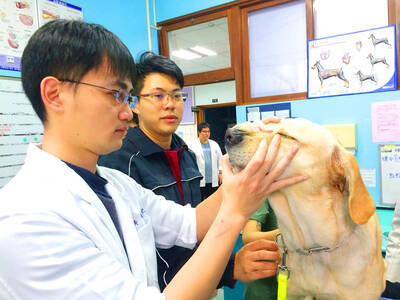A team of young scientists yesterday unveiled the results of their research into Criegee intermediates (CIs, also known as carbonyl oxides) — a transient molecule in the atmosphere that is linked to the generation of acid rain and suspended particulates — becoming the first scientists in the world to determine the reaction between CIs and water molecules, providing a solid basis for future atmospheric studies.
Academia Sinica research fellow Lin Chih-min (林志民), who led the project, said CIs are an extremely short-lived oxidant and scientists had been unable to observe them in action.
Previous attempts by international research teams at observing the molecule used a combination of mass spectrometry and synchrotron radiation, but the results had been confined to observing the CIs at less than 10 percent atmospheric pressure, he said.
By incorporating an ultraviolet absorption spectroscope and a series of prisms, the team was able to create an environment where the air pressure was close to atmospheric pressure, thereby gaining an understanding of how the CIs react with other molecules in the atmosphere.
By observing the reactions at various relative humidity levels — up to 85 percent at 298 Kelvin — the research discovered that CIs begin to decay extremely rapidly at high humidity, indicating that they interact with water at high concentration levels.
In addition, the research found that the higher the humidity, the less likely it was that CIs would interact with sulfur dioxide and nitrogen dioxide — chemicals known to be related to the generation of acid rain and major air pollutants.
Lin said that the age of his team made the success of the research even more remarkable.
Chao Wen (趙?), the first author of the article on the research, is a senior at National Taiwan University’s Department of Chemistry, while coauthors Hsieh Chun-ting (謝郡庭) is a sophomore at Stanford University and Chang Chun-hung (張俊宏) a postgraduate student at National Tsing Hua University.
When asked whether the research would lead to an effective way of tackling the problem of acid rain, Lin said that there are hundreds types of chemical reactions taking place in the atmosphere and that those involving CIs are just some of them.
“I think effective management of the sources of pollutants would be a more effective way to solve the problem of acid rain,” Lin said.
The team’s research has been accepted by international journal Science and was published on its Web site on Thursday last week.

Former Czech Republic-based Taiwanese researcher Cheng Yu-chin (鄭宇欽) has been sentenced to seven years in prison on espionage-related charges, China’s Ministry of State Security announced yesterday. China said Cheng was a spy for Taiwan who “masqueraded as a professor” and that he was previously an assistant to former Cabinet secretary-general Cho Jung-tai (卓榮泰). President-elect William Lai (賴清德) on Wednesday last week announced Cho would be his premier when Lai is inaugurated next month. Today is China’s “National Security Education Day.” The Chinese ministry yesterday released a video online showing arrests over the past 10 years of people alleged to be

THE HAWAII FACTOR: While a 1965 opinion said an attack on Hawaii would not trigger Article 5, the text of the treaty suggests the state is covered, the report says NATO could be drawn into a conflict in the Taiwan Strait if Chinese forces attacked the US mainland or Hawaii, a NATO Defense College report published on Monday says. The report, written by James Lee, an assistant research fellow at Academia Sinica’s Institute of European and American Studies, states that under certain conditions a Taiwan contingency could trigger Article 5 of NATO, under which an attack against any member of the alliance is considered an attack against all members, necessitating a response. Article 6 of the North Atlantic Treaty specifies that an armed attack in the territory of any member in Europe,

LIKE FAMILY: People now treat dogs and cats as family members. They receive the same medical treatments and tests as humans do, a veterinary association official said The number of pet dogs and cats in Taiwan has officially outnumbered the number of human newborns last year, data from the Ministry of Agriculture’s pet registration information system showed. As of last year, Taiwan had 94,544 registered pet dogs and 137,652 pet cats, the data showed. By contrast, 135,571 babies were born last year. Demand for medical care for pet animals has also risen. As of Feb. 29, there were 5,773 veterinarians in Taiwan, 3,993 of whom were for pet animals, statistics from the Animal and Plant Health Inspection Agency showed. In 2022, the nation had 3,077 pediatricians. As of last

XINJIANG: Officials are conducting a report into amending an existing law or to enact a special law to prohibit goods using forced labor Taiwan is mulling an amendment prohibiting the importation of goods using forced labor, similar to the Uyghur Forced Labor Prevention Act (UFLPA) passed by the US Congress in 2021 that imposed limits on goods produced using forced labor in China’s Xinjiang region. A government official who wished to remain anonymous said yesterday that as the US customs law explicitly prohibits the importation of goods made using forced labor, in 2021 it passed the specialized UFLPA to limit the importation of cotton and other goods from China’s Xinjiang Uyghur region. Taiwan does not have the legal basis to prohibit the importation of goods